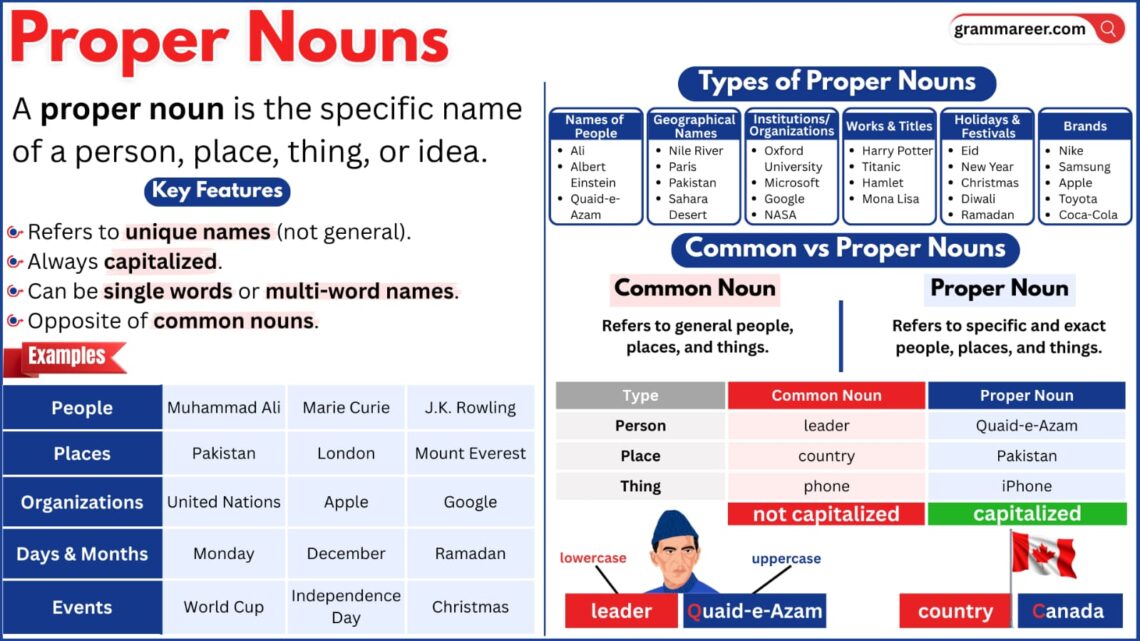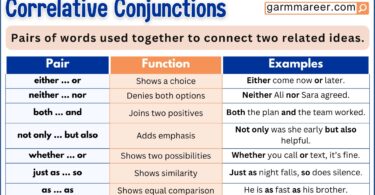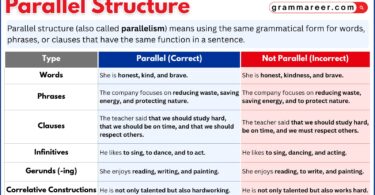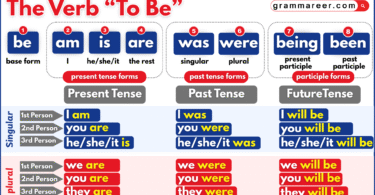A proper noun is simply the name of a specific person, place, or thing. For example, instead of saying river, you might say Indus River. Instead of day, you could say Friday. These names are always written with a capital letter, no matter where they appear in a sentence. Proper nouns make our sentences clearer because they point to one exact thing instead of something general.
Table of Contents
What is a Proper Noun?
A proper noun is simply the name of something specific. Instead of saying city, we say Lahore. Instead of day, we say Monday. These names are always written with a capital letter, no matter where they appear in a sentence.
Definition of a Proper Noun
In plain words, a proper noun is the word we use when we want to point to one exact person, place, or thing. Names of people, countries, languages, months, holidays, and even brands are all proper nouns because they identify something unique.
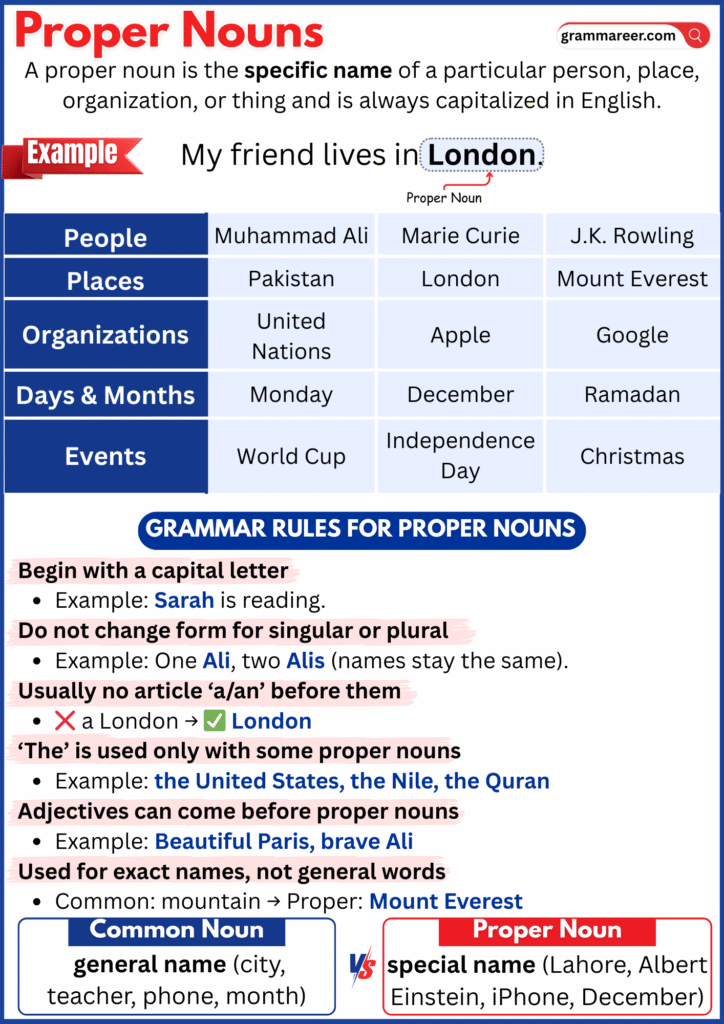
Proper Nouns vs CommonNouns
The difference between common and proper nouns is actually very easy once you see it in action.
- Common nouns are general words we use for people, places, or things. For example: boy, school, river, car. They don’t tell us which one in particular.
- Proper nouns are the exact names we give to those people, places, or things. For example: Ali, Oxford High School, River Nile, Toyota. These are always written with a capital letter, no matter where they appear in a sentence.
Think of it like this: country is a common noun, but Pakistan is a proper noun. Month is common, but January is proper.
| Common Noun | Proper Noun |
| city | Lahore |
| mountain | Mount Everest |
| singer | Atif Aslam |
| language | Urdu |
| book | Harry Potter |
If we sum it up, common nouns are general names for things, while proper nouns are the special names that make them unique.
The Rule of Articles in Proper Nouns
Most of the time, proper nouns don’t need articles like a, an, or the.
For example:
- we say Sara is my friend—not the Sara.
- Karachi is a big city—not the Karachi.
Proper nouns usually stand on their own.
But yes, there are some exceptions. Certain country names or organizations use the because of the words in their names, like:
- the United Kingdom
- the World Health Organization.
In these cases, the is part of the name, but notice it isn’t capitalized.
And sometimes, we use proper nouns like common nouns—when talking about groups or when we need to be more specific.
For example:
- The Khans are moving next door or I don’t mean this Ali, I mean Ali from school.
Capitalization Rules for Proper Nouns
Capital letters matter only when we write. In speech, nobody notices capitalization, but in writing, it makes sentences clear and correct. Here are some simple rules:
- Days, months, and holidays are always capitalized.
- Example: Friday, July, Eid.
- Seasons (spring, summer, etc.) are lowercase unless they are part of a title.
- Example: We met in winter vs. The Spring Festival.
- Family relations are capitalized when used as a name.
- Example: I told Mom about it vs. My mom is a teacher.
- Job titles get capitalized only when used before a name.
- Example: President Lincoln but Lincoln was the president.
- Countries, nationalities, and languages are always capitalized.
- Example: Pakistan, Japanese, Spanish.
- Brand names must be capitalized because they are unique.
- Example: Nike, Samsung.
- Historical events and eras also take capitals.
- Example: World War II, the Renaissance, the Mughal Era.
if it’s the name of something specific and unique, give it a capital letter.
When Nouns Can Be Both Proper and Common
Sometimes nouns change depending on how we use them. Let’s look at a few cases:
Family roles
Words like mom, dad, uncle, or grandma are common nouns when we use them in a general sense. But if we use them like a name, they act as proper nouns and need a capital letter.
Examples:
- I asked my mom to make tea.
- Nano is visiting us tomorrow.
Titles and positions
Job titles or positions are only capitalized when they’re part of someone’s name. Otherwise, they stay lowercase.
Examples:
- She works as a doctor.
- Doctor Ali treated my cough.
Directions
Words like north, south, east, west are common when we use them for directions, but they become proper when they refer to a specific place or region.
Examples:
- We drove north to the village.
- My cousin lives in North America.
Proper adjectives
Some adjectives come from proper nouns, so they’re also capitalized. These usually include nationalities, languages, or words linked to someone’s name.
Examples:
- He speaks Spanish fluently.
- The story has a very Shakespearean ending.
Proper Noun Examples in Sentences
- Ayesha is going to the bazaar to buy vegetables.
- Minar-e-Pakistan in Lahore is a famous landmark.
- The Pakistani Rupee is the official currency of Pakistan.
- Dr. Abdul Qadeer Khan was a respected scientist of the country.
- Karachi is known as the city of lights.
- Shalwar Kameez is the national dress of Pakistan.
- Allama Iqbal is remembered as the poet of the nation.
- K2 is the second-highest mountain in the world, located in Pakistan.
- Faiz Ahmed Faiz’s poetry is loved all over the country.
- Atif Aslam is a popular Pakistani singer with fans worldwide.
Why Proper Nouns Are Important
Proper nouns are important because they show us the exact name of a person, place, thing, or even an idea. And since they always begin with a capital letter, knowing how to use them correctly makes your writing clear and professional. Let’s look at some simple points where people often get confused:
1. Don’t capitalize random words
ust because a word feels important doesn’t mean it deserves a capital letter.
- ❌ I bought a new Car.
- ✅ I bought a new car.
(Car is not a proper noun—it’s just a thing. But Toyota would be a proper noun.)
2. Titles need capitals, but not every word
When writing book names, movie names, or titles, only the main words get a capital letter. Small words like a, an, the, in, on, of usually stay lowercase (unless they come first).
- ✅ The Lion King
- ✅ Harry Potter and the Chamber of Secrets
3. Don’t capitalize seasons and directions
Words like summer, winter, north, south are not proper nouns, so they stay lowercase—unless they’re part of a specific name.
- ✅ We travel in summer.
- ✅ My cousin lives in South Punjab.
4. Sun and Moon are special
When you’re talking about our Earth’s Sun or Moon, they get capital letters.
- ✅ Tonight the Moon looks so bright.
- ✅ The Sun rises in the east.
5. Job titles and departments
Capitalize job titles or office names when they point to a specific person or department.
- ✅ The Prime Minister addressed the nation.
- ✅ My brother works in the Finance Department.
But if you’re speaking generally, use lowercase: - ✅ She wants to become a prime minister someday.
You May Also Like

